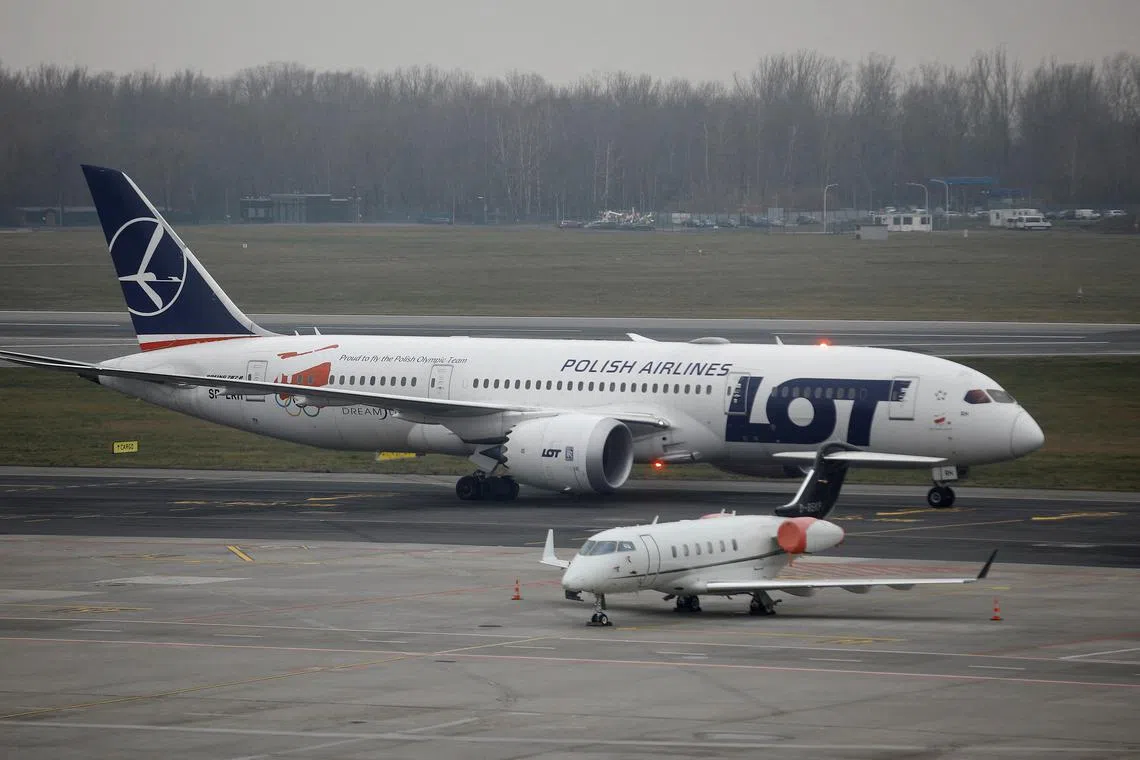The world just doesn’t have enough planes as travel roars back
Sign up now: Get ST's newsletters delivered to your inbox

Boeing and Airbus are sold out for their most popular single-aisle models through until at least 2029.
PHOTO: REUTERS
WASHINGTON - As travel springs back and China begins dismantling the last remaining Covid-19 curbs
With carriers from United Airlines to Air India placing, or looking to place, jet orders that number in the hundreds, Boeing and Airbus are crowing variously about blockbuster deals.
But supply chain constraints mean those planes would not be delivered until possibly years down the track, with Jefferies investment bank estimating that there is currently an order backlog of 12,720 aircraft.
All that means the sky-high airfares
“People got used to lower fares during the pandemic, and China’s reopening will make it worse,” Mr Ajay Awtaney, the founder of frequent flyer website LiveFromALounge.com, said. “It’s not just a shortage of planes but also other factors like oil prices.”
While one cashed-up airline in a particular jurisdiction may have the financial wherewithal to bring prices down, that would likely cause other carriers to stumble, leading to even higher fares in the long run, Mr Awtaney said.
Boeing and Airbus, the planemaking giants that largely enjoy a duopoly supplying passenger jets, are sold out for their most popular single-aisle models through until at least 2029.
Compounding the demand from airlines as people once again take to the skies with a vengeance and carriers look to refresh ageing fleets are supply chain challenges – everything from getting the necessary components to labour shortages.
Airbus earlier in December dropped its delivery goal of 700 jetliners in 2022, citing supply chain issues. And it has previously warned that a jump in energy costs will weigh particularly hard on smaller, power-intensive producers, such as those making castings and forgings.
According to the founder of Air Lease, Mr Steve Udvar-Hazy, every jet delivered to one of the world’s largest lessors over the past two years has been late.
“We haven’t gotten one airplane on time, whether it’s a 737 Max or a 787 or an A330, A350,” he said. “And the worst has been the A321neo. We’ve had delays of as much as six or seven months, comparing contract delivery month to actual delivery.
“It’s a combination of supply chain issues, ramping up too quickly and shortage of labour. Production workers can’t work from home. So it’s been a real problem.”
The thousands of planes that carriers stored in deserts around the world, unsure of when demand would return as travel collapsed in the wake of Covid-19 and countries shut borders, are also contributing to the shortage.
Hundreds have not been brought back into fleets, either because they now need heavy-duty maintenance after so long of not being used, or because airlines plan on phasing them out and have not bothered slotting them into their schedules again.
The end result for the flying public is eye-watering fares, which could rise even further as business travel returns and more people are willing to treat themselves as they holiday abroad for the first time in years.
It could also mean flying in older planes.
“As a last resort, we can see airlines extending ownership cycles,” said Mr Sunny Xi, a Singapore-based principal at consultancy Oliver Wyman.
Airlines in Asia historically plan fleets around 12-year cycles, which is lower than in most other regions. But during the restructuring that carriers have gone through over the past few years, several airlines have extended existing fleets and could do so again in the future, Mr Xi said.
For Boeing and Airbus, delivering the planes they have sold on time is now problem No. 1.
Airbus is already seeing airlines reluctant to place new orders for jets, considering that it has a backlog of more than 6,100 planes for the A320neo family that would take eight years to fill.
While it has long touted its plan to ramp up production to as many as 75 A320 jets a month, it has now pushed back that goal to the middle of the decade.
Investors in Boeing, which has announced around 850 gross orders this year, including the mid-December United Airlines deal, are, meanwhile, concerned about the slow progress the US planemaker has made in resolving its supply chain snarls and speeding work in its factories, RBC analyst Ken Herbert said.
The one bright spot? Employees working in the sector probably would not be laid off any time soon.
“The order backlogs are big enough that a recession wouldn’t really matter right now,” said Mr George Ferguson, an analyst with Bloomberg Intelligence. Manufacturers and airlines will hold on to people even if there are small hiccups, he added. BLOOMBERG


